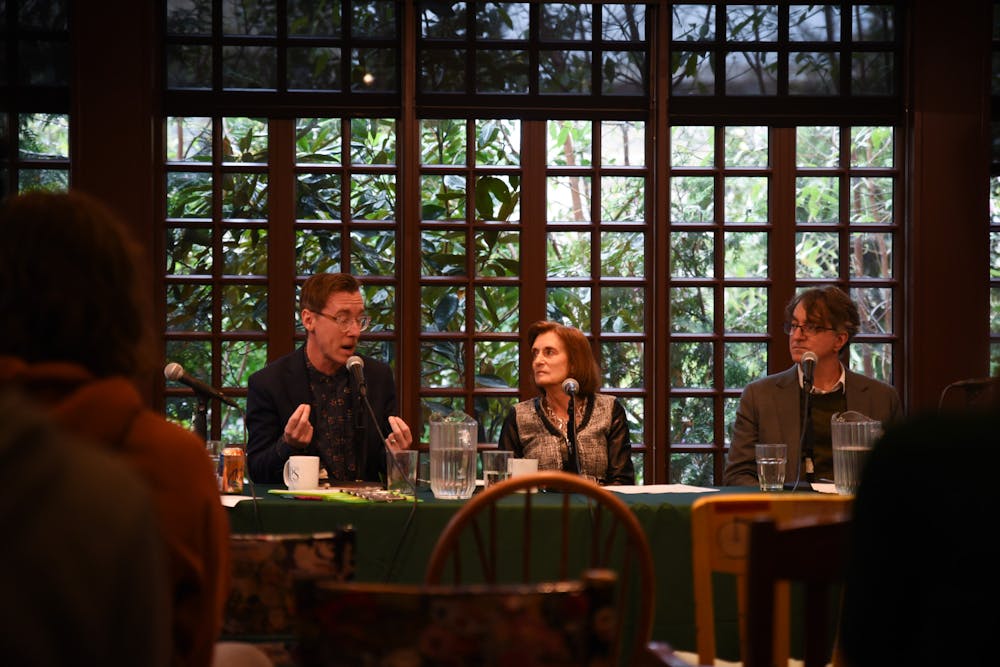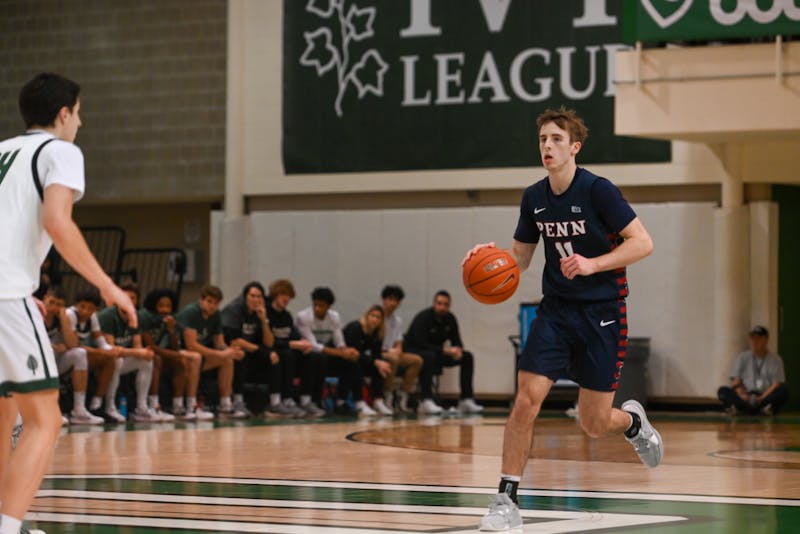
The Kelly Writers House hosted a student-organized panel discussion Monday about public media in the United States featuring several professors in law and communication.
The April 7 event — titled “Public Media: What You Need To Know” — was organized and moderated by College senior Victoria Feng and College junior and former staffer for The Daily Pennsylvanian Conor Smith. Panelists included professor and journalist Matt Katz, 1981 Penn Carey Law School graduate and Executive Vice President of WHYY Kyra McGrath, and the Annenberg School for Communication C. Edwin Baker Professor of Media Policy and Political Economy Victor Pickard.
Feng said she was inspired to host the panel after taking a course with Pickard, and she applied for the KWH annual Creative Ventures Capital Prize to fund her idea.
“I wanted to do this panel specifically at the Kelly Writers House because I've enjoyed attending many panels before and I wanted to expose our work to a greater audience,” Feng said.
Along with the event, the two are also working on an interactive map showing partnerships between public media and local news outlets.
The panelists opened the talk by speaking on their individual experiences in public media. McGrath spoke about her work at WHYY on the business and funding side of affairs, and discussed the founding of American public media, and Pickard continued by discussing how public media in the United States developed differently than in other democratic countries.
The two went on to discuss the Public Broadcasting Act of 1967 and the funding model of U.S. public media, which sees funding from the federal budget appropriated to public media two years in advance. Despite this, both mentioned how public media funding is “vulnerable” to political disagreement.
“Every Republican, except perhaps Gerald Ford, has gone after public broadcasting,” Pickard said.
Katz then spoke about his time working at The Philadelphia Inquirer and WNYC and how he has seen the journalism industry change over the years. He said that in his 15 years serving as a news reporter, he focused heavily on coverage that “basically no longer exists.”
“I went to Afghanistan to cover war for the Inquirer,” Katz said, “which is also something that doesn’t happen at local newspapers anymore.”
The three panelists also talked about the public media business model. McGrath described the decline of funding coming from the federal government and corporate underwriting, when businesses sponsor specific programming in exchange for on-air announcements acknowledging their support.
According to McGrath, about half of WHYY’s budget comes directly from donors and listeners.
“When I’m on [air], I always say, ‘the public in public media is you,'” McGrath said, “because some people think the public in public media is government money.”
Pickard emphasized that lessened funding will hit smaller stations the hardest, creating “news deserts,” or communities that are no longer covered by local news outlets. According to Pickard, only around 1% of NPR’s annual budget and around 15% of PBS’s annual budget comes from the federal government. He also noted how the decline of public media is a sign of weakening democracy.
“To call it a public media system is a bit of a misnomer,” Pickard said. “It also positively correlates with the health of democratic societies … according to The Economist … the strongest democracies on the planet also have the strongest public media systems.”
Katz and McGrath next spoke about the changing landscape of public media as the industry adopts a more commercialized model. Katz discussed how viewer clicks became more important during his time at WNYC and how the digital-first model lessened his ability to work on public radio. McGrath highlighted the importance of public media transitioning to digital as the reliance on public television lessens.
Near the end of the discussion, the three panelists spoke about the recent “attack” on public media from 1968 Wharton graduate and President Donald Trump’s administration.
“Politicians have long attacked [the] media and public media becomes an easy target because, ‘Oh, we give them a little money so let’s go after them,’” Katz said. “There’s no other outlet that tries to be as fair, even to a fault, as fair and impartial as public media.”
Pickard also emphasized how survey data has consistently shown relatively high levels of trust in public broadcasting. McGrath continued by bringing to light recent executive actions by the Trump administration.
“There’s a multipronged attack in Washington on public media now,” McGrath said. “Last week, there was a hearing where Marjorie Taylor Greene’s DOGE [sub]committee had the head of NPR and head of PBS there, where they were excoriated for bias. … I’ve been in public media for 25 years and it’s never been like this. I mean, when Newt Gingrich was speaker of the House, it was bad, but now, it’s 10 times worse.”
Though the event had been planned months in advance, Smith said he felt the timing was significant.
“Right now, in our current moment, it's important to have these types of panels for people to be able to advocate for public media and [these] institutions in our country,” he said.
The Daily Pennsylvanian is an independent, student-run newspaper. Please consider making a donation to support the coverage that shapes the University. Your generosity ensures a future of strong journalism at Penn.
Donate








